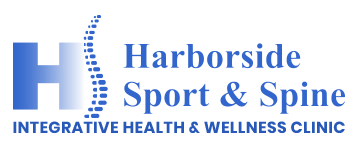Frozen Shoulder Treatment Specialist in Jersey City, NJ
Frozen shoulder, also known as adhesive capsulitis, is a condition causing stiffness and pain in the shoulder joint. Symptoms of a frozen shoulder start slowly and worsen over time, but usually improve within 1 to 3 years. The condition is caused by thick, stiff, and inflamed connective tissue. If you have a frozen shoulder, consult our board-certified Dr. David Sylvester, DC, at Harborside Sport & Spine about physical therapy or non-invasive measures to maintain joint mobility. For more information, contact us or book an appointment online. We serve patients from Jersey City, NJ, and surrounding areas.




Table of Contents:
What are the stages of a frozen shoulder?
Will a frozen shoulder heal on its own?
What happens if a frozen shoulder is left untreated?
What is the fastest way to heal a frozen shoulder?
At Harborside Sport & Spine in Jersey City, NJ, we offer specialized treatment for individuals suffering from frozen shoulder, a condition characterized by stiffness and pain in the shoulder joint. Our team of highly skilled specialists employs a comprehensive, personalized approach to diagnose and treat frozen shoulders, utilizing the latest techniques and therapies to restore mobility and alleviate pain. Whether you’re dealing with the initial onset of symptoms or have been struggling with restricted movement for some time, our dedicated professionals at Harborside Sport & Spine are committed to helping you achieve optimal shoulder health and return to your daily activities without discomfort.
Frozen shoulder progresses through three distinct stages, each characterized by unique symptoms and duration. The initial stage, known as the “freezing” stage, involves a gradual increase in pain and a decrease in the range of motion. This phase may extend anywhere between 6 weeks to 9 months. Following this, the “frozen” stage sets in, where the pain may slightly decrease but the shoulder becomes stiffer, making movement more difficult. This stage typically lasts 4 to 6 months. Finally, the “thawing” stage occurs, during which the range of motion in the shoulder begins to improve. This recovery stage can take anywhere from 6 months to 2 years. Each stage requires specific therapeutic approaches to effectively manage symptoms and promote healing.
While a frozen shoulder may gradually improve over time, the process can be lengthy, often taking up to 2 to 3 years for full recovery without intervention. During this natural course, the condition might resolve itself as it progresses through the freezing, frozen, and thawing stages. However, the pace at which this happens can vary greatly among individuals, and not all cases will see a complete restoration of movement and reduction of pain without treatment. Through physical therapy, targeted exercises, and, at times, more direct treatments, healing can be markedly hastened, mobility enhanced, and discomfort substantially reduced, surpassing the outcomes of passively waiting for natural resolution. Consequently, seeking medical advice and treatment can be crucial for those looking to expedite their recovery and return to their usual level of activity with minimal discomfort.
If a frozen shoulder is left untreated, the condition may gradually progress through its natural stages, which can span several years. However, without professional intervention, individuals may experience prolonged discomfort and significant limitations in shoulder movement. This lack of treatment can lead to muscle atrophy and the weakening of shoulder muscles due to disuse, exacerbating the difficulty of performing daily activities or tasks that require arm mobility. Furthermore, prolonged immobility can also result in the development of adhesions (scar tissue) within the shoulder joint, making future treatments more challenging and potentially leading to long-term functional impairments. Therefore, timely and appropriate management is crucial to avoid these complications and ensure a better outcome.
The swiftest route to recovery from a frozen shoulder emphasizes a multi-pronged approach combining physical therapy, targeted exercises, and, in some cases, medical interventions. Physical therapy, tailored to each stage of the condition, focuses on stretching and strengthening exercises to increase the range of motion and reduce pain. For immediate pain relief and to facilitate more aggressive physical therapy, corticosteroid injections can be considered. Additionally, the use of non-steroidal anti-inflammatory drugs (NSAIDs) helps in managing pain and inflammation. In scenarios where conservative treatments do not yield significant improvements, procedures like shoulder manipulation under anesthesia or arthroscopic surgery to loosen the joint capsule can be recommended. These treatment modalities, especially when initiated early, play a pivotal role in hastening recovery, aiming to restore shoulder functionality and comfort as swiftly as possible.
At Harborside Sport & Spine, we understand the challenges and discomfort associated with a frozen shoulder. With our expert team committed to providing personalized care, we invite you to take the first step toward recovery and improved shoulder health. Don’t allow pain and stiffness to limit your life any longer. Call us today or book an appointment online to explore your treatment options and start your journey to a more active, pain-free lifestyle. We serve patients from Jersey City NJ, Hoboken NJ, Weehawken NJ, West New York NJ, Guttenberg NJ, Secaucus NJ, Harrison NJ, Kearny NJ, Newark NJ, Belleville NJ, Lyndhurst NJ, East Orange NJ, and Elizabeth NJ.

Chiropractic and Physical Therapy Services
▸ Chiropractic
▸ Physical Therapy
▸ Massage Therapy
▸ Acupuncture
▸ Spinal Decompression
▸ Prenatal Chiropractor
▸ Ear Infections
▸ Foot Pain
▸ Headaches
▸ Scoliosis
▸ Slipped Disc
▸ Sprained Ankles
▸ Stress
▸ Frozen Shoulder
▸ Osteoporosis
▸ Shoulder Pain






